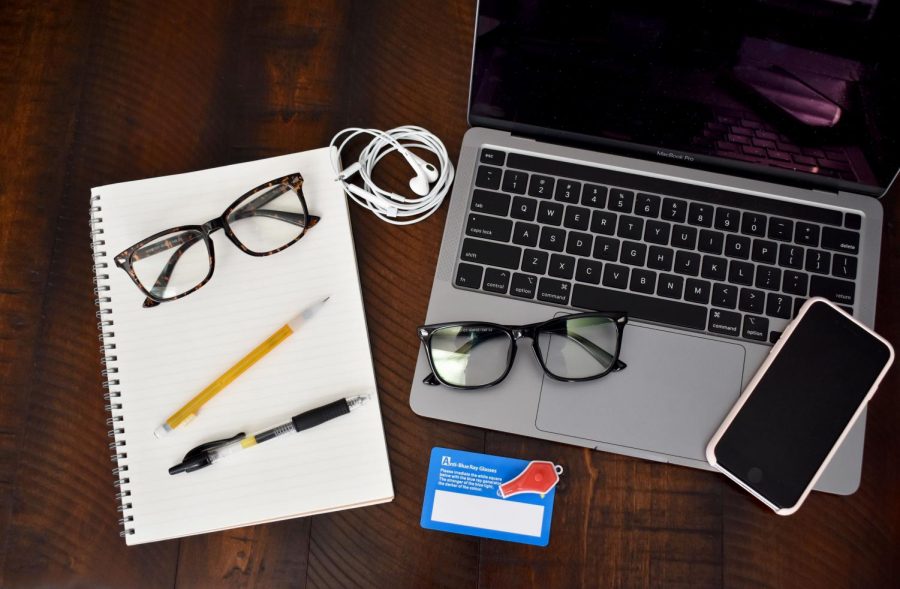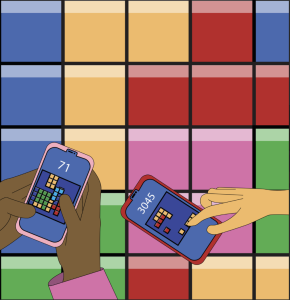Students turn to blue light glasses to cope with virtual learning
Blue light glasses have risen as a means for students to cope with virtual learning.
November 3, 2020
According to a 2019 Common Sense Media report, the average teenager spends over seven hours using screens every day. However, there’s a catch: this number doesn’t include time spent using screens for school or homework. With the onset of the COVID-19 pandemic, this number has significantly increased for many students as they are participating in virtual learning. Whether it be for Zoom meetings, asynchronous assignments, or talking to friends during lunch, time spent in front of a screen is arguably at an all-time high for students doing online school.
This large amount of time spent in front of a screen affects the body, specifically the eyes, in many different ways. The blue light emitted from screens can cause eye fatigue and dryness, nearsightedness, loss of focusing ability, and even retinal damage in severe cases. Because of these negative health effects, more and more people are turning to blue light glasses to help protect their eyes.
Blue light glasses are glasses that can block out some of the blue rays emitted from screens. They have filters or coatings on the lenses that reflect blue light rays, bouncing them back towards the screen instead of through to the wearer’s eyes. They look like normal glasses, but they can be bought with or without a prescription.
I had been seeing a lot about these glasses on social media, so at the start of online learning, I bought a pair of highly-reviewed blue light glasses on Amazon to see what the hype was all about. The ones I bought came with two pairs of glasses, a small blue light generator, and a tester card to test the light on and see how the glasses work. When I initially put the glasses on, I noticed that they had a sort of yellow tint. There didn’t seem to be any other difference as to how my computer screen looked, but I did think that they seemed to be fairly high quality, especially for the low price that they were. I was also impressed with how little light got through the lenses when I tested it with the card.
After wearing the glasses for a longer period of time, I got used to the yellow tint and eventually didn’t even notice it. My eyes were slightly less tired and irritated than they normally were after a long day of Zoom meetings, but the difference wasn’t as big as I assumed it would be. The glasses were still very comfortable and felt durable, despite how cheap they were. As a contact lens wearer, I really liked that I could wear these glasses at the same time as my contacts, and still be able to see while also protecting my eyes from harmful blue light rays. One downside to these specific glasses is that they cannot be easily worn at the same time as other prescription glasses, but fortunately many other blue light glasses can also be bought with a prescription.
Overall, I would rate these blue light glasses an eight out of ten. They are a good option for someone who is spending a lot of time in front of screens, but doesn’t feel the need to pay a lot of money to protect their eyes. I would give them a seven out of ten on effectiveness because I didn’t see a huge change in my vision or eye health after using them. However, I did try to wear them if I was on my phone at night, and that did make it feel easier to fall asleep. Lastly, I would rate them a nine out of ten on both comfort and durability. I was impressed with how they felt and how sturdy they were throughout all my Zoom meetings, especially because I wasn’t expecting a lot from these areas, as they were so cheap.
Despite my positive experience with these glasses, it is important to remember that they are not a solution to the negative effects of blue light on the eyes and body. The only way to truly keep yourself safe from overexposure to these rays is to reduce the amount of time spent looking at screens, especially at night. I would recommend blue light glasses to people who have to spend large amounts of time looking at screens, perhaps for online school, and want a cheap way to help protect their eye health.










